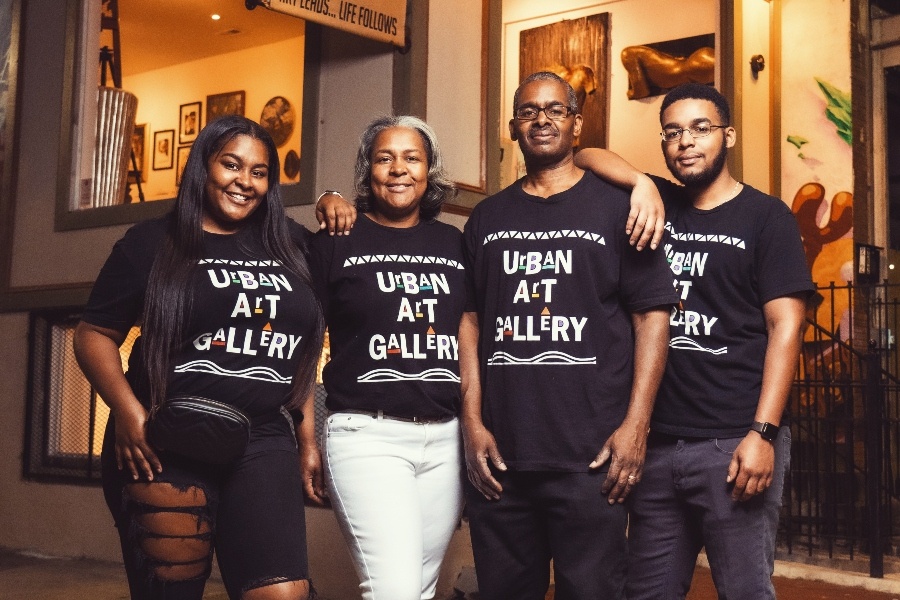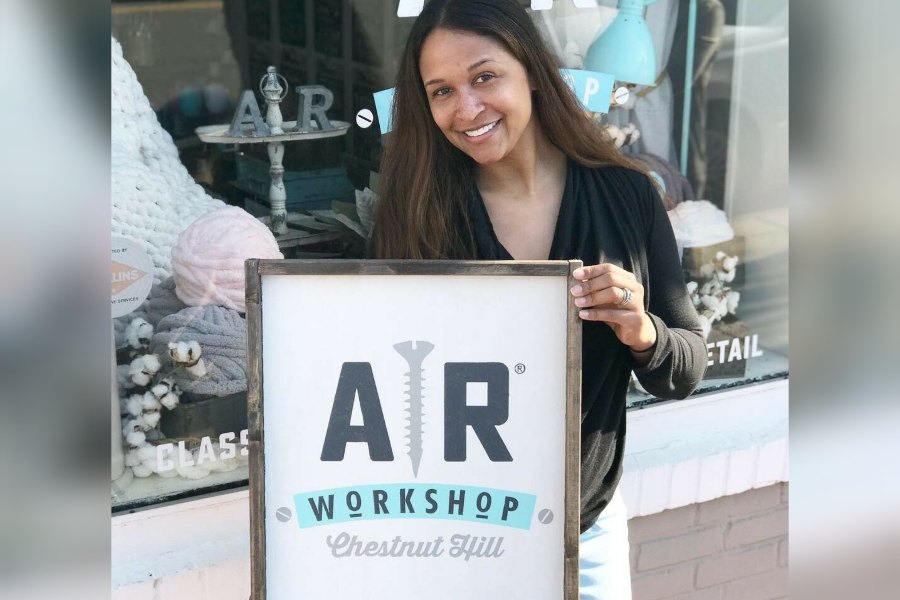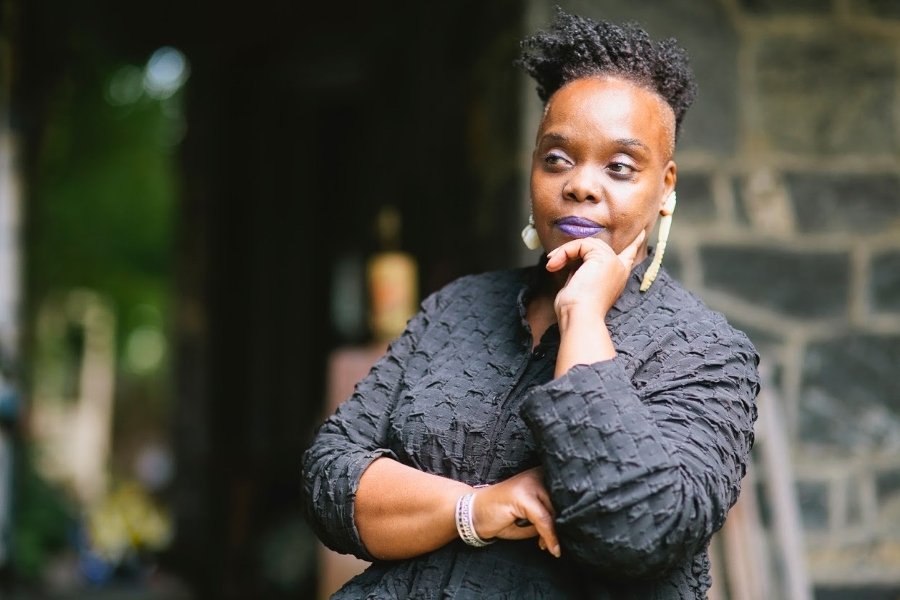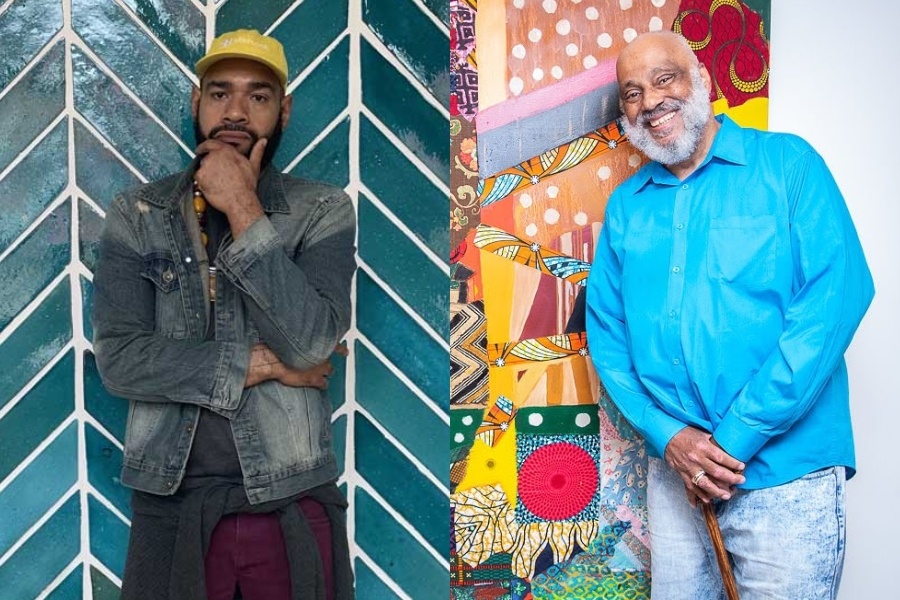Meet the 2.5 Percent: Philly’s Black Business Owners in the Arts
In Philly, where only 2.5 percent of businesses are Black-owned, these entrepreneurs have overcome more obstacles than most. Then came the pandemic, which has created unique challenges for businesses that rely on gathering people indoors.

Kalphonse Morris (third from the left) is the owner of the Urban Art Gallery located at 262 South 52nd Street in West Philadelphia, pictured here with (L-R) his daughter, Milan Morris, his wife, Pamela Morris, and his son, Karl Morris. / Ken McFarlane
“Meet the 2.5 Percent” is a bi-weekly series that features stories from entrepreneurs and business owners working to recover from COVID-19, as well as damage and looting during Philly’s civil unrest. If you are a Black business owner and would like to share your story, please email qmuse@phillymag.com.
Philadelphia is known for its vibrant arts scene. From large museums and private galleries to boutique craft shops and murals, Philly is teeming with spaces where natives and tourists can view and create art in many forms. But art businesses thrive on the ability to gather, and the presentations they create are meant to be experienced with others, often in small spaces indoors with people sitting or standing close to one another — all conditions that pose an increased risk for contracting coronavirus. As non-essential businesses, Philly’s indoor galleries and art spaces have been closed since mid-March due to the pandemic and the subsequent civil unrest that ripped through the city in June.
These Black-owned art businesses have struggled to stay afloat amid long-term closures with no indication of when it will be safe to resume hosting events and gatherings in their spaces at the level they were accustomed to before the pandemic. They represent the mere 2.5 percent of businesses in Philadelphia that are Black-owned. Every other week, we’re highlighting members of Philly’s Black-owned business community whose stores have been damaged or looted, or whose businesses have been impacted by the coronavirus pandemic so you can get to know and support them.
AR Workshop Chestnut Hill
8607 Germantown Avenue

Rikki-Quinn James-Renz is the owner of the AR Workshop franchise location in Chestnut Hill. / Courtesy
Rikki-Quinn James-Renz, 42, wanted to be the first person in her family to become an entrepreneur; she wanted to establish a business that her children could benefit from and be proud of while also fulfilling her dream of owning a business by the time she turned 40 years old.
“I have two teenagers and I wanted them to be able to experience what it is like to own a business and to know that their goals and dreams are attainable as long as they work hard for it,” James-Renz said.
In March 2019, James-Renz used the money she’d spent years saving in her 401k to purchase AR Workshop Chestnut Hill, a boutique DIY shop that offers unique, instructor-led workshops, helping customers create custom home décor items and personalized gifts. It is the only Black-owned AR Workshop franchise location in the state. James-Renz was fortunate to be able to purchase the shop from a previous owner and assume the business in turnkey condition. From there, she built on the existing customer base and quickly saw increased revenue with some creative marketing and advertising.
Then, in March 2020, exactly one year after opening, the pandemic forced James-Renz to shut down the shop.
“One day we were having full workshops, scheduling parties and planning for summer camp and the next day we had to close our doors,” she said.
Almost overnight, James-Renz had to find a way to convert in-person workshops to at-home settings. She began by creating home do-it-yourself (DIY) kits and giving customers the option of coming to the store to pick them up or having them delivered to their home. Customers who had already signed up for in-person workshops and parties had to reschedule their events or use store credit towards the purchase of home DIY kits. James-Renz did it all while maintaining her day job as the Director of Contracts and Supply Services at Temple University Hospital (TUH), a role that she assumed in March in the department responsible for finding personal protective equipment (PPE) for the entire health system.
She has since begun to slowly reopen her shop with required masking for customers and staff and workshops reduced to 50 percent to ensure adherence to social distancing rules. (You can support AR Workshop Chestnut Hill by purchasing to-go DIY kits here). As her business continues to push toward a return to normalcy, James-Renz says she’s determined to encourage more Black people to consider becoming franchisees.
“I think most Black people know that franchises exist but there isn’t enough awareness of which businesses are franchises. For example, McDonald’s and Chick-fil-A are well-known franchises and most people equate fast food places like these as franchises with hefty price tags to own them. But there are many franchises that are not food-related that are less expensive and more profitable,” she said.
“I think it is important for Black and brown people to own businesses that are different from selling clothing and food. Expressing oneself through creative outlets gives such purpose and pride, that I want to be a part of creating that experience for everyone.”
Urban Art Gallery
262 South 52nd Street

Kalphonse Morris (third from the left) is the owner of the Urban Art Gallery located at 262 South 52nd Street in West Philadelphia, pictured here with (L-R) his daughter, Milan Morris; his wife, Pamela Morris; and his son, Karl Morris. / Courtesy
Few things inspire Kalphonse Morris, 53, more than his love of art. Morris came to West Philadelphia from London, England with his parents when he was five years old. He’s been determined to bring something unique and art-driven to his West Philadelphia neighborhood ever since.
“I wanted to give emerging artists a platform to showcase their work,” Morris said. “But we’re not only here as a platform; we provide free programs in art, music, chess and mentoring to children because we believe in giving back. I’ve always wanted to give back to our community.”
Morris used personal savings and a loan to purchase the building at the corner of 52nd and Irving Streets that opened as the Urban Art Gallery in April 2013. The Urban Art Gallery has become a welcomed treasure in a community where few art galleries exist.
“A large percentage of the people in our neighborhood have never been in an art gallery,” Morris explained. “I invite them in so they can appreciate and be inspired by art. It gives me great pleasure when people say they love what we are doing here, especially in the hood.”
Morris says he understood the seriousness of the pandemic, so he quickly obliged when he was forced to close the gallery in Mid-March. But having to cancel all exhibits, events and monthly new artist showcases for several months has put a deep dent in the gallery’s revenue. Despite his losses, Morris was most disappointed that the gallery had to cancel its programs for children and youth. (You can support Urban Arts Gallery by making a tax-deductible donation here).
Morris is hopeful that the gallery will be able to fully reopen and begin hosting limited, socially distanced events sometime between July and September. He looks forward to, again, being an open resource for members of his community to see and experience art.
“Urban Art Gallery is important to me because it allows us to show the beauty of the arts in our community and giving back to our community is an awesome experience,” he said. “To touch so many lives is amazing.”
The Colored Girls Museum
4613 Newhall Street

Vashti DuBois is the owner of The Colored Girls Museum located at 4613 Newhall Street. / Courtesy
As a young Black girl growing up in Brownsville Brooklyn, New York, Vashti DuBois, 59, was desperate to find places where her existence and identity were affirmed and celebrated. She wanted spaces in the world that made her feel safe and welcome; and she wanted to know that, somewhere in the world, there was a place that knew and cared about her experience and the experiences of other Black girls who looked like her.
DuBois created The Colored Girls Museum to meet that need.
The museum originally launched as a show at the Philadelphia Fringe Festival in 2015. When the show ran again in 2016, DuBois was overwhelmed by the number of visitors who came from around the city, and from other cities and states to see the exhibit. She decided she wanted to convert the show into a more permanent space for art by and for Black women and girls. She knew that would be anything but easy.
“I knew that people would not necessarily believe in or even be able to conceptualize something like a Colored Girls Museum, a space that would center the experience of ordinary Black women and girls, that would be in, of all places, an ordinary house in a working-class Black neighborhood,” DuBois said.
But she set out to create it anyway.
DuBois used her own savings to purchase the building at 4613 Newhall Street in Germantown, where she’s lived for the last 20 years. And she worked with volunteers who donated their time to procuring art, because as DuBois said, “We didn’t have access to donors or a line of credit or rich relatives.”
She attributes the museum’s early success to her business partners, Ian Friday and Michael Clemmons, and the first brave collective of artists who stepped up to contribute their artifacts and art.
Like many other Philly museums, the pandemic hit The Colored Girls Museum hard.
DuBois said the museum was anticipating a strong season. The museum had just received a grant to convert its programs to virtual and augmented reality with partners from the University of Arizona. The project would allow The Colored Girls Museum to expand its reach beyond the modest twin Victorian house it currently occupies, attracting broader audiences to the physical space and increasing the museum’s visibility and revenue. Critical pieces of the VR project were indefinitely postponed due to travel bans preventing her collaborators from meeting on site, and the museum has had to make several other changes to continue operating even a fraction of its programs. (You can support The Colored Girls Museum by donating to their capital fund here or by making a donation directly to the museum here).
“It was difficult to close,” DuBois said. “But once the pandemic took hold not only did we have to close, we also had to quickly pivot and move our girl’s program online as many other organizations and schools have had to do.”
DuBois says The Colored Girls Museum’s physical space cannot reopen until they’re able to invest in the things they need to make the space safe for guests when they return.
“As an institution that serves communities disproportionately impacted by COVID-19, we take seriously the need to make sure our guests, staff and volunteers are protected and safe.”
Rush Arts Philadelphia
4954 Old York Road

Noah Smalls (L) is the gallery director and Danny Simmons (R) is the founder of Rush Arts Philadelphia, an art gallery located at 4954 Old York Road. / Courtesy
In 2015, Danny Simmons, 65, took a leap of faith when he moved from New York City to Philadelphia, sold his brownstone in Brooklyn, and used the proceeds to purchase an old bank annex at 4954 Old York Road in the Logan section of the city.
He spent the next year converting the poorly maintained space into a pristine art facility, renovating everything from old ceilings and floors to plumbing, walls and lighting, piecing together funds from any source he could find.
“I really couldn’t get much of a loan for renovations or for buying the building,” Simmons said. “So, I used the remainder of the proceeds from the sale of my Brooklyn Brownstone and, when that fell short, I took out a loan against my new Northern Liberties home to finish the work.”
Rush Arts Philadelphia opened in September 2016 under the Rush Philanthropic Arts Foundation, a 501c3 nonprofit Simmons co-founded with his brothers, Russell Simmons and Joseph “Rev. Run” Simmons in New York in 1995. Rush Arts Philadelphia is a dedicated exhibition and program space that aims to provide opportunities to both local artists and curators and arts-based educational opportunities for local youth who can benefit from them the most.
The pandemic forced Rush Arts to close its physical location — which still has not reopened — and to cancel their most successful fundraiser events, leaving Simmons worried that the Philadelphia location and the organization at-large might not survive the lengthy closure. (You support Rush Arts Philadelphia by making a tax-deductible donation here).
“Frankly, our reserves are dwindling quickly. I’m concerned for the survival of Rush Arts now in its 25th year,” he said.
Rush Arts Philadelphia gallery director, Noah Smalls, 42, says the center is still doing its best to keep the community engaged.
“Since the pandemic, we have invigorated our virtual presence and worked to engage our core audience of child arts students, emerging artists, and art patrons by moving our existing programs to a virtual format,” said Smalls.
Since closing in March, Rush Arts has hosted more than a dozen virtual programs including virtual artist roundtables, private artist studio tours and weekly art workshops for kids. Follow Rush Arts on Instagram for the latest on virtual events.


